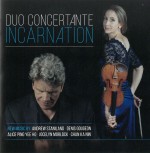 Incarnation (Marquis MAR 81479) is the new CD from Duo Concertante, the husband-and-wife team of violinist Nancy Dahn and pianist Timothy Steeves. It features new music by Canadian composers Andrew Staniland, Denis Gougeon, Alice Ping Yee Ho, Jocelyn Morlock and Chan Ka Nin.
Incarnation (Marquis MAR 81479) is the new CD from Duo Concertante, the husband-and-wife team of violinist Nancy Dahn and pianist Timothy Steeves. It features new music by Canadian composers Andrew Staniland, Denis Gougeon, Alice Ping Yee Ho, Jocelyn Morlock and Chan Ka Nin.
On their website (duoconcertante.com) Dahn says that as a student she was fascinated by the connections between some of her favourite composers and the players who inspired and first performed their works. By commissioning new works from Canadian composers it was the duo’s hope that they could share a similar devotion to the music of our time.
Staniland’s The River Is Within Us is a highly lyrical piece with decided undercurrents. Gougeon’s Chants du cœur is a two-movement work with a predominantly slow and melodic first part and a livelier, more dynamic second. Ho’s Cœur à cœur is described by the composer as an imaginary conversation between two voices: it’s a lyrical, animated emotional piece with a rhapsodic middle section and an ethereal ending.
Morlock’s Petrichor (the scent of rain on dry earth) is described as exploring an emotional landscape of anticipation, joy and release; its contrasting moods form an arc from a restrained opening through an ecstatic middle to a serene ending.
Chan’s Incarnation was commissioned as a companion piece to the Schubert works for violin and piano, attempting to revive the composer “…as if Schubert’s spirit were travelling through modern times.” Dahn plays electric violin to underline the contemporary aspect, although there is only the occasional distortion before a real “shredding” section over the opening piano figure from Schubert’s Erlkönig song. It provides a fascinating conclusion to another rich and deeply satisfying CD from this duo.
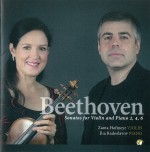 A few years ago Duo Concertante issued a quite outstanding and very sensitive recording of the complete Beethoven Violin Sonatas. The performances on Beethoven Sonatas for Violin and Piano 2, 4, 6 by South African violinist Zanta Hofmeyr and Bulgarian pianist Ilia Radoslavov (Blue Griffin BGR415) are very similar in style, tempo and tone – which is saying a lot. The sonatas here are those in A Major Op.12 No.2, A Minor Op.23 and A Major Op.30 No.1.
A few years ago Duo Concertante issued a quite outstanding and very sensitive recording of the complete Beethoven Violin Sonatas. The performances on Beethoven Sonatas for Violin and Piano 2, 4, 6 by South African violinist Zanta Hofmeyr and Bulgarian pianist Ilia Radoslavov (Blue Griffin BGR415) are very similar in style, tempo and tone – which is saying a lot. The sonatas here are those in A Major Op.12 No.2, A Minor Op.23 and A Major Op.30 No.1.
Hofmeyr is another former Juilliard student who studied with the legendary Dorothy DeLay; she has a soft, warm tone and a fairly wide vibrato which is always used judiciously. Radoslavov is terrific in the always busy piano part – remember that these sonatas, like Mozart’s, were published as being for piano and violin and not the other way around – and while the violin clearly is no longer optional, the piano still carries a bigger workload in the early sonatas.
Hofmeyr apparently features the complete Beethoven cycle in her concert recitals, but there is no indication that this CD is the start of a complete recording. Given the lovely playing here, such a project would be a welcome addition to the catalogue.
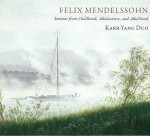 Felix Mendelssohn – Sonatas from Childhood, Adolescence, and Adulthood is an outstanding CD from the Karr-Yang Duo of violinist Abigail Karr and pianist Yi-heng Yang (Olde Focus FCR910).
Felix Mendelssohn – Sonatas from Childhood, Adolescence, and Adulthood is an outstanding CD from the Karr-Yang Duo of violinist Abigail Karr and pianist Yi-heng Yang (Olde Focus FCR910).
Great care has been taken to make these historically idiomatic performances. The piano is a contemporary Conrad Graf from about 1827 (a maker held in the highest regard by Mendelssohn), and the violin is appropriately fitted for the period. The piano is actually very strong, lacking the resonance of a modern grand but not at all dry or unsatisfying; the tonal colour and dynamic range are quite lovely. Karr’s playing is sensitive, never overtly Romantic but always exhibiting controlled emotion, with the gut strings and a spare and sensitive use of vibrato adding to the effect.
The works themselves are glorious examples of Mendelssohn’s astonishing talents. The Sonata No.1 in F Major, written in 1820 when he was just 11 years old, is a lovely work with a simply dazzling Presto finale. Sonata No.2 in F Minor Op.4 came three years later, and the short, unfinished Sonata Fragment in D two years after that. Only the Sonata No.3 in F Major is an adult work, written when the composer was 29; left unfinished with three mostly complete but heavily revised movements, it is presented here in a performing version prepared by the Karr-Yang Duo.
There is a wonderful feel to these performances, which are virtuosic but always sensitive to Mendelssohn’s style. Excellent booklet notes by the performers on the works and performance practice enhance a terrific CD.
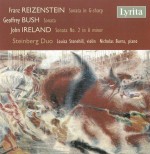 Three fascinating but rarely heard Violin Sonatas by Franz Reizenstein, Geoffrey Bush and John Ireland form the program on the new CD from the Steinberg Duo, the English husband and wife team of violinist Louisa Stonehill and pianist Nicholas Burns (Lyrita SRCD 360).
Three fascinating but rarely heard Violin Sonatas by Franz Reizenstein, Geoffrey Bush and John Ireland form the program on the new CD from the Steinberg Duo, the English husband and wife team of violinist Louisa Stonehill and pianist Nicholas Burns (Lyrita SRCD 360).
Reizenstein was a German composer forced to flee the country by the growing Nazi threat, moving to England in 1934. His 1945 Violin Sonata is in the key of G-sharp – not major or minor, but exploring the tension between both modalities. It’s a strong, challenging work that amply demonstrates Reizenstein’s ability to build chromatic and dissonant music around a strong tonal centre.
The Bush Violin Sonata also dates from 1945 and is a lyrical single-movement work with a constantly shifting tonal centre; it is rarely performed and has never been recorded before. Ireland’s Violin Sonata No.2 in A Minor was written between late 1915 and early 1917 and caused a sensation on its London premiere, when it was felt to have perfectly captured the mood of the period. The elegiac slow movement may well represent an elegy for the war dead as well as a requiem for the pre-war society that had vanished forever.
Stonehill and Burns are in fine form throughout the CD. The duo migrated to Keene, New Hampshire, last year, and the CD was recorded in the beautiful acoustics of the Françoys-Bernier Concert Hall at Domaine Forget in Quebec.
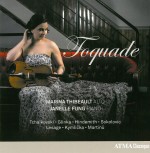 The Quebec violist Marina Thibeault is joined by Vancouver-born pianist Janelle Fung on Toquade, a recital of works for solo viola, and viola and piano (ATMA Classique ACD2 2759).
The Quebec violist Marina Thibeault is joined by Vancouver-born pianist Janelle Fung on Toquade, a recital of works for solo viola, and viola and piano (ATMA Classique ACD2 2759).
Tchaikovsky’s Valse sentimentale, a transcription of the last of his Six Morceaux for Piano Op.51, is a fine opening track, followed by the first movement of Glinka’s Sonata in D Minor. The heart of the CD, though, is the excellent performances of four works for solo viola, including three by contemporary Canadian composers: Hindemith’s Sonata Op.31 No.4; Ana Sokolovic’s Prélude (2006); Jean Lesage’s Toquade (2016); and Milan Kymlička’s Rubato & Agitato (2008). The latter work, written shortly before the composer’s death, was dedicated to Thibeault and premiered by her in Prague the same year.
A lovely performance of the Sonata for Viola and Piano Op.31 H335 by Bohuslav Martinů rounds out the CD. Written in 1955 when Martinů was nearing the end of his life and becoming increasingly unhappy in the United States, its lyrical, rhapsodic nature allows both performers to shine.
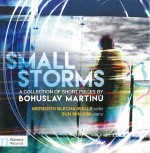 The Czech composer has a whole CD to himself in Small Storms – A Collection of Short Pieces by Bohuslav Martinů featuring American cellist Meredith Blecha-Wells and South Korean pianist Sun Min Kim (Navona Records NV6092). The CD’s title is well-chosen: 20 of the 31 combined tracks from the six works are under two minutes in length and only two are longer than three minutes.
The Czech composer has a whole CD to himself in Small Storms – A Collection of Short Pieces by Bohuslav Martinů featuring American cellist Meredith Blecha-Wells and South Korean pianist Sun Min Kim (Navona Records NV6092). The CD’s title is well-chosen: 20 of the 31 combined tracks from the six works are under two minutes in length and only two are longer than three minutes.
Martinů wrote three sonatas and seven shorter works for cello and piano, with only the Pastorals from 1931 missing from the latter on this disc. The works are Variations on a Theme of Rossini H290 from 1942 (the theme being the same Prayer from Moses used in Paganini’s violin Variations on the G-String); Ariette H188B from 1930; Seven Arabesques H201, the seven-movement Suite Miniature H192 and the four Nocturnes H189, all from 1931; and Variations on a Slovakian Theme H378 from 1959, the year of his death.
Blecha-Wells is technically dazzling in the Rossini variations, and the sweeping phrasing, passion and fine dynamic range together with a great balance with the piano continue throughout the disc. The final Variations on a Slovakian Theme provide an equally dazzling conclusion to an excellent CD.
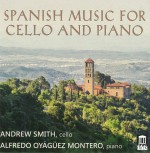 American cellist Andrew Smith met the Spanish pianist Alfredo Oyágüez Montero in 1999, performing Manuel de Falla’s Suite Populaire Espagñole in recital with him the following year. That eventually led to an all-Spanish recital program that the duo has performed around the world, and Spanish Music for Cello and Piano is the resulting CD (Delos DE 3492).
American cellist Andrew Smith met the Spanish pianist Alfredo Oyágüez Montero in 1999, performing Manuel de Falla’s Suite Populaire Espagñole in recital with him the following year. That eventually led to an all-Spanish recital program that the duo has performed around the world, and Spanish Music for Cello and Piano is the resulting CD (Delos DE 3492).
The Falla suite (an adaptation of the Siete Canciones Populares Españolas for voice and piano) is here, along with works by Enrique Granados, Gaspar Cassadó, Xavier Montsalvatge and Joaquin Turina. Cassadó is represented not only by his Sonata Nello Stile Antico Spagnuolo, the Danse du Diable Vert and Requiebros but also by his arrangement of the Granados Intermezzo from Goyescas; in addition, Turina’s own transcription of his piano piece El Jueves Santo a Medianoche was made at Cassadó’s request and dedicated to him. Montsalvatge’s Cinco Canciones Negras is Smith’s own transcription of the composer’s song cycle for mezzo-soprano. The Pablo Casals arrangement of the traditional Catalan song El Cant dels Ocells completes the disc.
There is beautiful playing and a lovely balance throughout the CD, with Montero not surprisingly providing a perfectly judged accompaniment for Smith’s warm and sensitive interpretations.
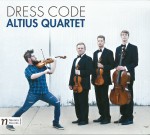 Dress Code (Navona Records NV6078) is the fascinating new CD by the American Altius Quartet, and features the four movements of Haydn’s String Quartet in C Major Op.74 No.1 interspersed with Three Rags by William Bolcom and arrangements by the group’s cellist Zachary Reaves of pieces by Dave Brubeck, Michael Jackson and Led Zeppelin, Ben E. King’s Stand by Me and the Norwegian band a-ha’s Take on Me.
Dress Code (Navona Records NV6078) is the fascinating new CD by the American Altius Quartet, and features the four movements of Haydn’s String Quartet in C Major Op.74 No.1 interspersed with Three Rags by William Bolcom and arrangements by the group’s cellist Zachary Reaves of pieces by Dave Brubeck, Michael Jackson and Led Zeppelin, Ben E. King’s Stand by Me and the Norwegian band a-ha’s Take on Me.
The claim that the CD is a survey of popular music “throughout the ages” is a bit of a stretch, given the gap of almost 200 years between the Haydn and the other selections, but the startling thing is how well Haydn fits in. The Andantino grazioso sounds decidedly modern following Led Zeppelin’s Stairway to Heaven arrangement, and the Menuetto fits quite naturally between Bolcom’s own brilliant arrangements of his Poltergeist and Incineratorag, almost making it sound like an integrated work.
The Haydn is played in a warm, rich style, which perhaps helps to bridge the stylistic gap between the centuries. Oddly, the disc continues to run for a full three minutes after the final track, at which point a blues-tinged bonus suggestive of Ride Sally Ride appears. There’s no mention of it anywhere in the CD package.
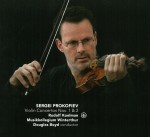 The Dutch violinist Rudolf Koelman is the outstanding soloist in Sergei Prokofiev – Violin Concertos Nos.1 & 2, recorded live with the Swiss orchestra Musikkollegium Winterthur conducted by Douglas Boyd (Challenge Classics CC72736).
The Dutch violinist Rudolf Koelman is the outstanding soloist in Sergei Prokofiev – Violin Concertos Nos.1 & 2, recorded live with the Swiss orchestra Musikkollegium Winterthur conducted by Douglas Boyd (Challenge Classics CC72736).
The Concerto No.1 in D Major Op.19 was completed in 1917, although not premiered until 1923. Despite being written in the year of the Russian Revolution during the Great War it is a predominantly lyrical work, with Prokofiev apparently finding his inspiration during walks in the countryside. The Concerto No.2 in G Minor Op.63 from 1935, on the other hand, reflects the composer’s intention to write a concerto that differed markedly from the first one in form and content. The predominantly slow-fast-slow movement structure of the first concerto is reversed, the second concerto having a decided folk influence and a lengthy, lyrical middle movement.
Koelman, who was a pupil of Jascha Heifetz in the late 1970s and concertmaster of the Royal Concertgebouw Orchestra in Amsterdam in the 1990s, has a bright, strong tone and lovely phrasing, and receives excellent support from the orchestra. These are beautifully recorded performances of two really lovely concertos.
 Ilya Gringolts is the soloist in the Korngold and Adams Violin Concertos with the Copenhagen Philharmonic Orchestra under Julien Salenkour (in the Korngold concerto) and Santtu-Matias Rouvali (in the Adams) (Orchid Classics ORC100066).
Ilya Gringolts is the soloist in the Korngold and Adams Violin Concertos with the Copenhagen Philharmonic Orchestra under Julien Salenkour (in the Korngold concerto) and Santtu-Matias Rouvali (in the Adams) (Orchid Classics ORC100066).
When Adams wrote his concerto in 1993 he realised that he would have to “solve the issue of melody.” While he describes the work as “almost implacably melodic” it’s not always melodic in the traditional sense; rather than engaging in dialogue the violin plays almost continually against the orchestral background, and there are lengthy passages of strong rhythmic patterns, especially in the nonstop Toccare third movement. Regardless, Gringolts gives a commanding performance.
The Korngold Concerto in D Major Op.35 is a glorious work from 1945, built for the most part on themes from the composer’s Hollywood film scores and displaying the same lyrical, lush Romanticism. Again, Gringolts is superb, his passionate performance capturing the essence of the work without ever risking letting it sound excessively sentimental.
Glorious recorded sound and tremendous orchestral playing add to a superb CD.



